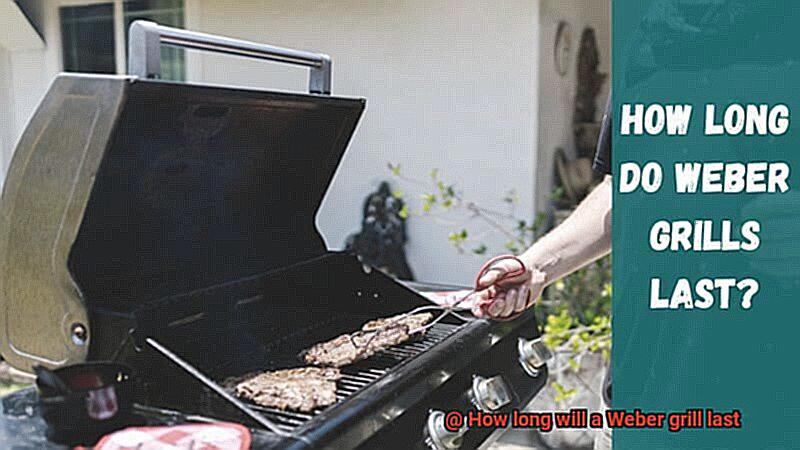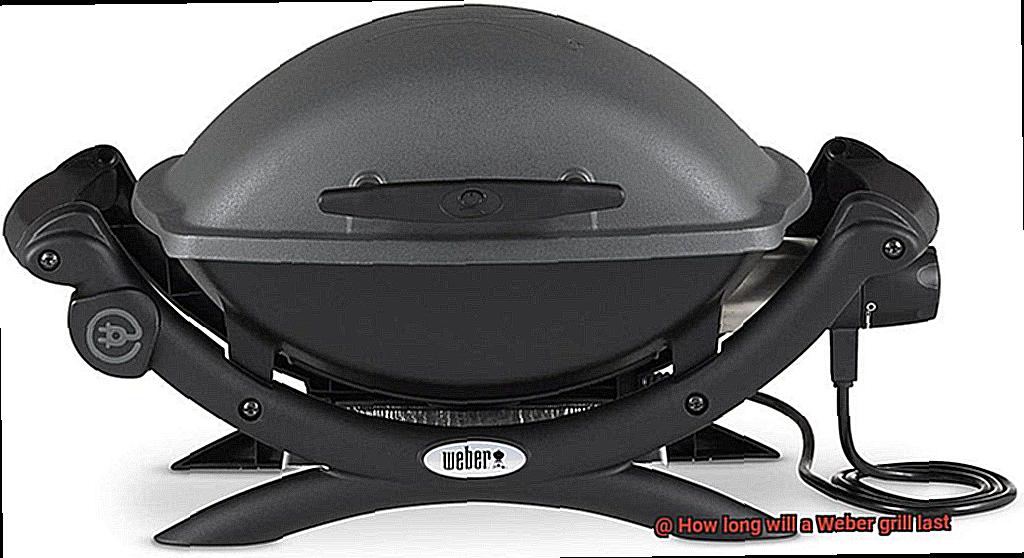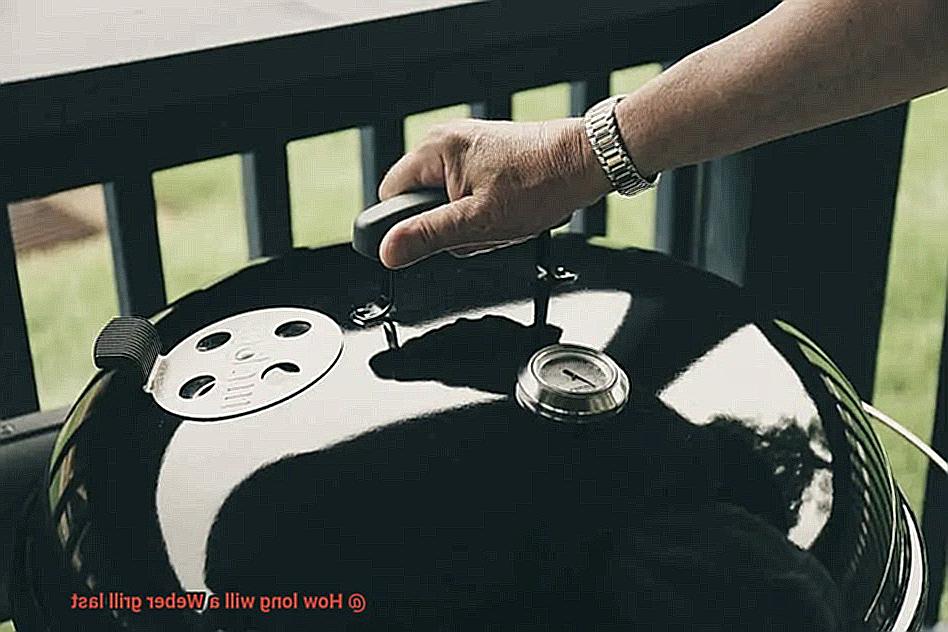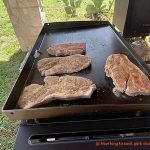Are you a grill fanatic on the hunt for a reliable and long-lasting grilling partner? Look no further than Weber grills. These bad boys are renowned for their durability and longevity. But, how long can you expect your Weber grill to last? It’s a question that plagues the minds of every grill aficionado out there. The answer is dependent on several factors such as usage frequency, maintenance, and weather conditions.
Luckily, with proper care and maintenance, Weber grills can last for decades. They’re crafted using top-notch materials like porcelain-coated steel, cast iron, and stainless steel that make them resistant to rust and corrosion. The lid and body of these grills are made from high-grade aluminum and steel that can withstand extreme temperatures and weather conditions. Plus, they’re easy to clean and maintain – essential for extending their lifespan.
In this blog post, we’ll give you an overview of how long a Weber grill can last along with tips on how to maximize its lifespan. We’ll also dive into the key features that make Weber grills so durable and long-lasting while sharing our best practices for caring for your grill. So sit back, relax, grab a cold one (or two), and keep reading to learn all about the lifespan of your beloved Weber grill.
Contents
What is a Weber Grill?
Weber grills are more than just a brand of high-quality grills. They represent a legacy of innovation, durability, and quality construction that has endured since the 1950s. George Stephen founded the company, driven by his frustration with the limitations of traditional open-fire grilling. With Weber grills, he set out to create a better outdoor cooking experience and succeeded.
Weber grills are known for their longevity, thanks to their high-quality construction and materials. Heavy-duty stainless steel, cast iron, and other durable materials withstand years of use. The company offers a wide range of grill models, from gas to charcoal and electric options, as well as portable and built-in models. Each model is designed with specific features and functions to meet the needs of different types of grillers.
One of the most popular features of Weber grills is their patented Flavorizer bars. These bars vaporize drippings and create a smoky flavor in the food being cooked, enhancing its taste and giving it a more authentic grilled flavor. The grates and burners resist rust and corrosion, ensuring that your food is not only delicious but also safe to eat.
Proper care and maintenance are essential for ensuring the longevity of your Weber grill. Regular cleaning of the grates and burners is necessary, as is checking for any leaks or damage. Storing your Weber grill in a dry place during the off-season will also help extend its lifespan.
Quality of the Grill and Durability
Grilling is more than just a cooking method; it’s a way of life. And for any true grilling enthusiast, the quality and durability of their grill are paramount. That’s why, as an expert on this topic, I can confidently say that nothing beats the quality and durability of a Weber grill.
Weber grills are not just cooking appliances; they represent a legacy of innovation and durability that spans over half a century. One of the key factors that make Weber grills stand out is their exceptional materials. The body of the grill is crafted from cast aluminum, which is exceptionally sturdy and capable of withstanding high temperatures without warping or cracking. This means that your Weber grill will endure even the hottest grilling sessions without any issues.
Another crucial aspect of Weber grills’ quality is their grates. Most Weber grills come with stainless steel grates that are rust-resistant and easy to clean. These grates can handle high temperatures without warping or cracking, ensuring that your food is evenly cooked every time you grill. Whether you’re searing steaks or smoking ribs, your Weber grill will deliver delicious results every time.
But it’s not just about the materials; the design of a Weber grill also plays a significant role in its durability. These grills are designed to be user-friendly, with features like removable ash catchers and propane tank holders that make maintenance a breeze. Additionally, the even heat distribution throughout the grill ensures that your food is cooked to perfection no matter where it’s placed on the grates.

Maintenance and Cleaning
As an avid griller, you know that a Weber grill is more than just a cooking tool. It’s an investment that requires proper maintenance and cleaning to ensure its longevity. With these expert tips on maintenance and cleaning, your Weber grill can last for many years.
First and foremost, regular cleaning is crucial for keeping your grill in top condition. After each use, use a grill brush or scraper to remove any leftover food debris or ash from the grates and ash catcher. Soak the grates in warm soapy water to remove stubborn grime, rinse them thoroughly, and dry them before storing.
But cleaning the grates is just the beginning. To avoid malfunction or fire hazards, it’s important to clean the burners, flavorizer bars, and grease tray regularly. Take these parts out of the grill and scrub them with a wire brush. Dispose of any grease or debris from the grease tray before replacing it.
In addition to cleaning, regular maintenance is also essential for extending the life of your Weber grill. Check for any signs of wear and tear on parts like the igniter, thermometer, and gas hoses. If you notice any damage, replace these parts as soon as possible.
Finally, when storing your Weber grill for an extended period of time, protect it from the elements by covering it with a waterproof cover. This will prevent rust and other damage caused by exposure to moisture.
Storing the Grill During Off-Season
It’s time to give your trusty Weber grill a break, but don’t just shove it in storage without taking proper care of it. After all, your grill is more than just a cooking machine; it’s been the centerpiece of countless family gatherings and delicious meals. So, how do you store it properly? Here are some essential steps:
Thoroughly clean your grill: Before storing your Weber grill, take the time to clean it thoroughly. Get rid of any leftover food particles, grease, and ash from the grill grates and interior surfaces. A clean grill not only lasts longer but also makes prep for the next grilling season easier.
Disconnect the propane tank or remove the charcoal: For propane grills, turn off the gas valve before removing the tank. Store the propane tank in a cool, dry place away from direct sunlight. For charcoal grills, ensure all charcoal is completely extinguished before disposing of it.
Cover your grill: After cleaning and disconnecting the tank or removing the charcoal, protect your grill from dust, dirt, and moisture during the off-season by covering it with a high-quality weather-resistant cover. Ensure that the cover fits snugly over your grill and is secured tightly to prevent any pests from getting inside.
Store in a dry and cool location: Choose a location to store your grill during the off-season that is dry and cool. Avoid damp basements or garages where moisture can build up and cause rust or other damage.
By following these steps, you can ensure that your Weber grill lasts for many years and continues to provide mouth-watering meals for you and your family. Properly storing your grill during the off-season will also save you time and money by reducing costly repairs or replacements in the future.
Frequency of Use
A well-maintained Weber grill can last anywhere from 5 to 20 years, but it all depends on how often you use it.
If you’re an occasional griller who only fires up the grill a few times a year, congratulations – with proper maintenance, your Weber grill could last for up to 10-15 years. However, if you’re someone who loves to grill multiple times a week, your Weber grill may only last for 5-7 years due to the wear and tear caused by frequent use.
The more you use your Weber grill, the more damage it will experience. Exposure to harsh elements like extreme temperatures and rain can also affect its lifespan. But don’t worry – there are ways to ensure your Weber grill lasts as long as possible.

Here are some tips:
- Keep it clean: Regularly cleaning the grates and burners is essential to prevent damage and ensure optimal performance.
- Check for damage: Inspect your Weber grill for any rust or damage and replace any damaged parts immediately.
- Store it properly: When not in use, store your Weber grill in a dry place and cover it with a weather-resistant cover to protect it from the elements.
- Use it wisely: Consider using low and slow cooking methods that are less harsh on your Weber grill than high-heat cooking methods.
Factors that Impact the Lifespan of a Weber Grill
That’s why it’s essential to understand the factors that can impact the lifespan of your Weber grill and take the necessary steps to protect it. Here are the key factors you need to know:
Firstly, the quality of materials used in the construction of your Weber grill is crucial. Weber grills are made from high-quality materials like stainless steel and cast iron. These materials are designed to withstand the elements, resist rust and corrosion, and provide durability for years of use.
Maintenance is another key factor that can extend the life of your Weber grill. Regular cleaning after each use, inspecting and replacing worn parts, and storing your grill in a dry, protected area when not in use are crucial steps to take. Neglecting maintenance can lead to rust, corrosion, and other damage that can shorten your grill’s lifespan.
The environment in which you use your Weber grill is also important. Exposure to extreme temperatures, moisture, and salt air can all contribute to rust and corrosion, which can shorten the life of your grill. If you live in a coastal area or an area with harsh weather conditions, be sure to take extra precautions to protect your grill.
The frequency of use is another factor that can impact the lifespan of your Weber grill. While these grills are designed to handle frequent use, excessive use can still take its toll on the components and reduce its lifespan. Consider how often you use your grill and adjust accordingly.
Lastly, the type of fuel you use can affect the lifespan of your Weber grill. Gas grills tend to last longer than charcoal grills because they produce less ash and require less cleaning. However, both types of grills can last a long time if properly maintained.
How Long Will a Weber Grill Last?
The answer is simple: it depends on various factors, such as maintenance, type of grill, and frequency of use. In general, however, with proper care and maintenance, a Weber grill can last for about 10-15 years.
Maintenance is the key factor that affects the lifespan of your Weber grill. Regular cleaning of the grill grates, burners, and grease management system after each use is crucial to prevent rust and corrosion build-up over time. A deep cleaning every few months can also go a long way in extending the life of your grill.
The type of grill you choose also plays a significant role in its longevity. Weber offers a range of grills from entry-level charcoal grills to high-end gas grills. Charcoal grills typically outlast gas grills as they have fewer moving parts and are less susceptible to mechanical failures. However, investing in a high-end gas grill with stainless steel construction can also provide an extended lifespan similar to charcoal grills.
Another factor to consider is the frequency of use. Naturally, if you use your Weber grill regularly, it will wear out faster than if you use it occasionally. Nonetheless, proper care and maintenance can still help extend its life significantly.
Tips to Ensure Longevity of Your Weber Grill
To ensure the longevity of your Weber grill, we have compiled some tips that will help you maintain it like a pro.
Clean Your Grill Regularly:
Cleaning your grill after every use is essential to prevent the buildup of grease and food particles that can cause rust and corrosion. Using a grill brush or scraper to remove any debris from the grates and burners is highly recommended as it keeps your Weber grill clean and ready for the next cookout. It’s also essential to clean the interior of your Weber grill periodically to prevent any food residue from building up.
Protect Your Grill from Elements:
Weather elements like rain, snow, and sun can damage your grill over time. A simple investment in a cover will protect it from the elements when not in use. This will help prevent sun damage and other types of wear and tear from damaging your beloved Weber grill.
Store Your Grill in a Dry Place:
When storing your Weber grill during the off-season, make sure to store it in a dry place to prevent moisture from causing rust and corrosion. A garage or storage shed is an ideal place to store your grill where it’s protected from the elements and kept dry.
Use High-Quality Fuel:
Using low-quality fuel can cause damage to your grill’s burners and other components. It’s important to use high-quality fuel such as charcoal or propane for optimal performance. This ensures that your Weber grill lasts longer and performs at its best.
Replace Worn-Out Parts:
Certain parts of your grill may become worn out or damaged over time. It’s important to replace these parts as soon as possible to prevent further damage. This will ensure that your Weber grill continues to perform at its best for years to come.
Conclusion
To all the grill masters out there, if you’re looking for a durable and long-lasting grilling companion, look no further than Weber grills. With proper care and maintenance, these grills can stand the test of time and become a backyard staple for decades to come.
The lifespan of your Weber grill depends on several factors such as usage frequency, maintenance, and weather conditions. Constructed with high-quality materials like porcelain-coated steel, cast iron, and stainless steel, these grills are resistant to rust and corrosion. The lid and body are made from top-grade aluminum and steel that can withstand extreme temperatures and weather conditions.
To extend the life of your grill, it’s important to keep it clean after each use by regularly cleaning the grill grates, burners, and grease management system. A deep cleaning every few months will also help maintain its longevity. Additionally, investing in a cover will protect it from the elements when not in use.
Whether you prefer gas or charcoal fuel, both types of Weber grills can last a long time if properly maintained. Gas grills tend to last longer due to less ash production and easier cleaning.
In conclusion, with proper care and maintenance tips from our experts, your Weber grill can last up to 10-15 years or even longer.






